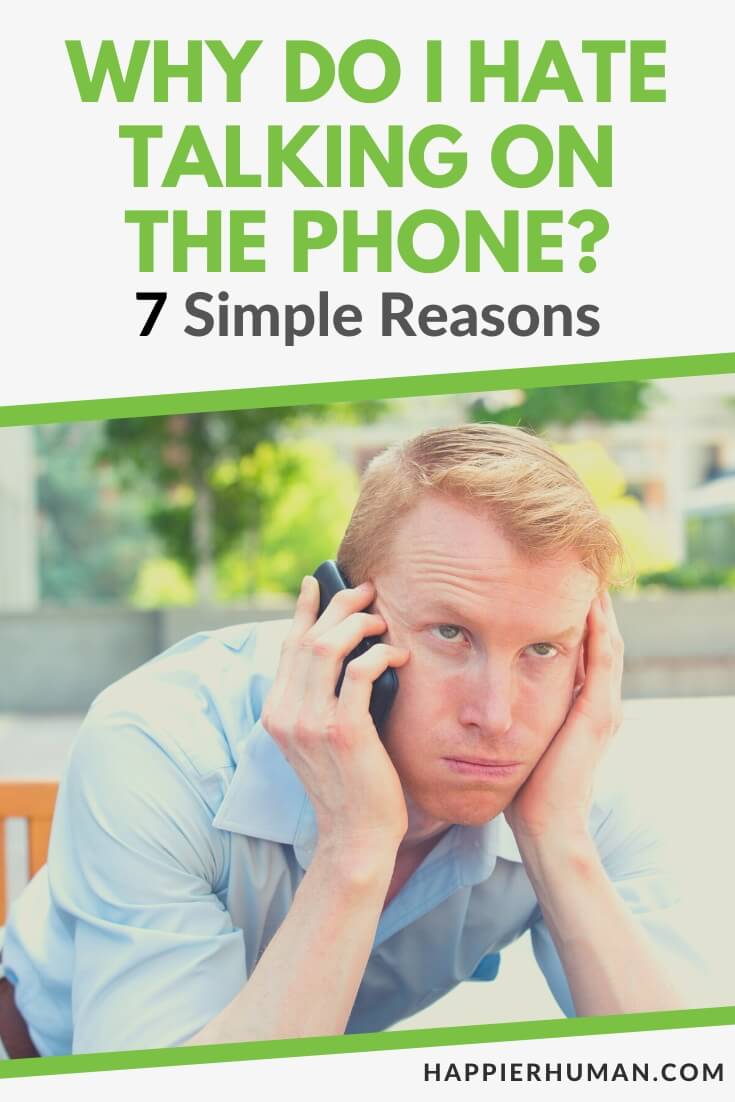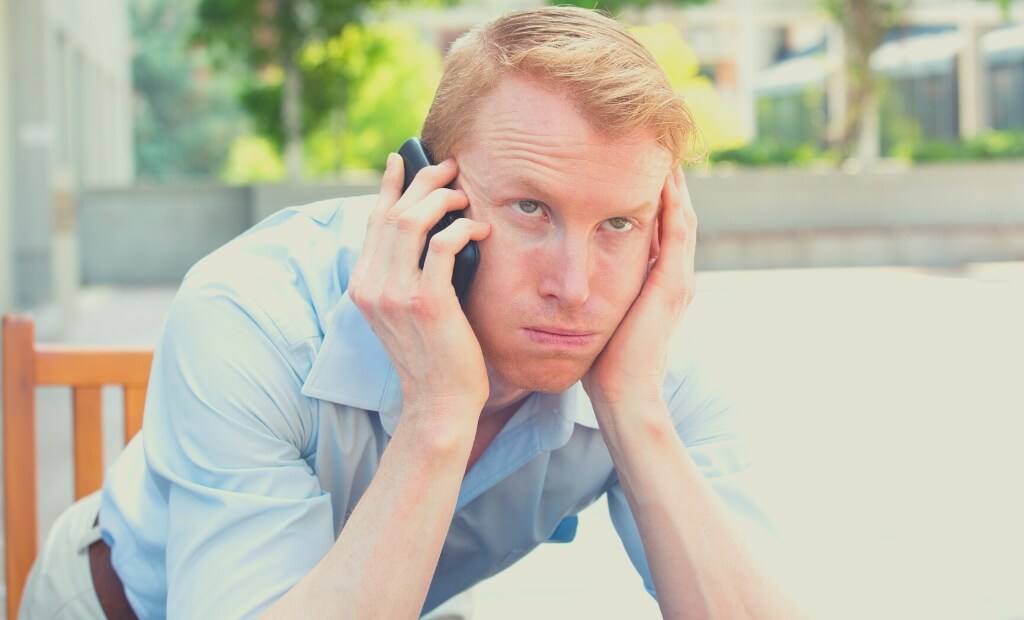There are many different reasons why people hate talking on the phone. According to various studies, those reasons include concern about sounding weird to the caller, being misunderstood, fear of being unable to satisfy the caller's need, or the caller not thinking highly of them.
And often it is an introvert that fits the bill. That is why very few introverts are found pursuing careers as telephone operators.
Text messages and emails seem much less intrusive; we can answer those at our convenience. Phone calls are often viewed as distractions, and talking on the phone is draining. Additionally, there is a real rising concern about spam callers wasting our time. Plus, aren’t phone calls considered the “dark ages of communication.”
Because of these feelings, many of us seek to avoid talking on the phone as much as possible. Instead, we stare at it as it rings, cringe every time we hear it ring, and finally let the voicemail answer the phone for us. Then we hope the caller doesn’t leave an open-ended or vague voicemail requesting a callback, or the phone anxiety overwhelms us even more.
We may be avoiding phone calls because it is a sign of a social anxiety disorder or simply an indication that we are naturally introverts.
What is an Introvert?
With personality qualities known as inversion, a person is considered an introvert when they are more concerned with their inner ideas and thoughts instead of things happening around them. In addition, introverts prefer time spent alone or with one or two people rather than in a crowded room or among larger groups.
Introverts are often quiet and shy people who want to be alone (I know, I am one of them), but the determination as to a person being introverted or extroverted hinges on how they process things surrounding them.
In the 1920s, a psychologist named Carl Jung started using words like extrovert and introvert to distinguish between two different personality types and how they get or spend their social energies. He realized introverts recharge by turning to their own minds, while extroverts are energized by feeding off other people.
As an introvert, you can relate to Carl Jung's assessment. Being around a group of people drains you, and you cannot wait to be alone. So, while in the group, you sought one-on-one conversations with others to sustain you until you could leave the group setting.
Psychologists Jonathan Creek, Jennifer Grimes, and Julie Norem divided introversion into four types in 2011. Those groups include thinking introverts, restrained introverts, anxious introverts, and social introverts.
Do you feel more at peace when alone, curled up on the couch with a good book? Do you also find solitude and enjoyment in researching and studying in a secluded environment? If so, you are considered a thinking introvert.

Maybe you are the type of introvert that prefers predictable activities, is not very emotional, or does things at a slower, methodical pace. Moreover, have people described you as reserved, stable, thoughtful, and one who keeps personal information close to the chest? If so, you may be a restrained introvert, according to the latest phycological studies.
Anxious introverts avoid social interaction with others at all costs. In addition, when they are around others, they seem nervous and turn inward when others talk to them. Furthermore, planning things within their comfort zones is best when getting to know anxious introverts in a dating setting.
Like the other three types of introverts, social introverts dislike large crowds. They don't avoid large groups because of some social anxiety but because they prefer not to be. Alone time helps them to regroup and recharge, especially when they are in a relationship.
Moreover, this type of introvert will rely on their intuition when they meet someone and size them up. But unfortunately, social introverts will also agree to attend social events without the intention of showing up.
No matter the type of introvert you may be, one thing all four classes have in common is a strong dislike for talking on the phone.
Why Do I Hate Talking on the Phone? 7 Simple Reasons
1. You hate being interrupted.
Phone calls ruin your concentration because you thrive in an environment where you can concentrate on one thing. A disruptive call takes your attention off what you are doing. It shifts it to the unknown and unpredictable needs of the caller.
In addition, phone calls are annoying because they disturb your peace, ability to focus, and consume your energy. Let's face it, introverts are not suited for multitasking. As a result, we rush to resolve the issue on the phone to get back to what we were doing previously.
2. You have trouble ending the phone call.
Being on the phone with someone going on and on about everything under the sun can be draining. That is why introverts try to avoid phone calls.
When on the phone, introverts hate to interrupt others when they are talking and find it challenging to interject and end a call.

Before you know it, 30 minutes, an hour, or an hour and a half has passed, and you are antsy, ready to get off the phone.
Therefore, you spend a good part of the conversation trying to come up with polite ways to end the call and urgent excuses to wrap things up. As introverts, we would be more comfortable on the phone if the calls were more predictable and the time spent talking predetermined.
3. No time to prepare for the call.
A phone call usually catches us off guard. The moment it rings, we don’t know who it is or what they want initially. The call puts us on the spot, and we dread answering the caller’s questions, hoping we can quickly and accurately answer the question.
In addition, phone calls only give us a little time to think when we don't have a solution. Moreover, we also hope there are only a few questions so that we can end the call quickly.
4. You prefer texts over phone calls.
Text messages are less intrusive for introverts than phone calls. Texts don’t usually require immediate answers, so there is less pressure. And, let us be honest, we can even act like we didn’t see a text if we don’t feel like responding to it right away.
But we are on the hook once we answer a phone call. Most things people call about could be sent through text anyway, right?
5. Phone calls don't allow you to observe social cues during the conversation.
On a telephone call, the caller can’t see that you are miserable the whole time you are on the phone. And if you call someone, you can’t tell if they are annoyed by your call.
Overall, phone calls take away an introvert's ability to use social cues. Because they thrive on in-person communication. Moreover, they are observers of a person’s posture and body language. Therefore, listening to someone’s tone of voice alone doesn’t give comfort to an introvert.
6. You fear being misunderstood.
Introverts dislike confusion and hate misunderstandings. So, phone conversations can be frustrating when you have trouble hearing the person on the line because of a poor connection or other phone issues. It reminds me of the Verizon Commercial where the technician asks, “Can you hear me now?”

We also feel self-conscious around others when talking on the phone and feel like our grandparents when we have to raise our voices to speak. Unfortunately, we do this as a habit, even when we have trouble hearing the caller.
7. The person calling isn’t someone we want to talk to.
As an introvert, I am adding another layer to this when I say that we don't always hate talking on the phone. It just depends on who is calling. A few people call, and we are okay with answering. But then, most others call, and it sends us into an internal wrestling match as to whether or not we want or should answer the call.
Generally, the circle of people we communicate with is small. So, anyone calling outside of it will make us feel uneasy.
How Do I Tolerate and/or Avoid Talking on the Phone?
Even though we may hate talking on the phone, we simply cannot always avoid it. So, we must understand how to cope with it while finding creative ways to navigate it. Here are a few tips to help you navigate phone calls and tolerate being on the phone when it's unavoidable.
Final Thoughts on Why Do I Hate Talking on the Phone? 7 Simple Reasons
As an introvert in an extrovert world, people may think something is wrong with you because of your preferred methods of communication. Extroverts like crowds. You like being alone. They love talking on the phone for hours. You turn the ringer off so you don't hear the phone ring. There is nothing wrong with either preference.
However, it doesn’t hurt to face your fears and move past some false narratives you have in your mind about talking on the phone. One of the best ways to move forward and overcome some of your phone anxiety is to be transparent about your anxieties.
Help your friends and family understand you better and allow them to communicate with you in a way that makes you feel comfortable. Also, feel free to meet them halfway so that you may overcome some of your apprehensiveness about talking on the phone.
Finally, if you want a simple way to reduce your stress and anxiety, then try writing these 35 mindfulness journaling prompts to live more in the present moment.


